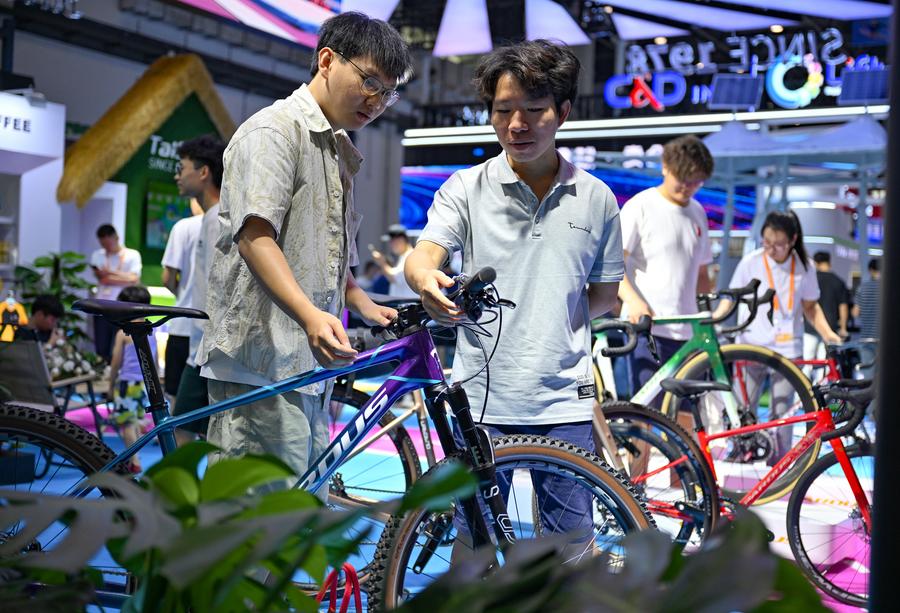Visitors try the bicycles at the booth of Taishan Sports Industry Group Co., Ltd. during the fourth China International Consumer Products Expo in Haikou, capital city of south China's Hainan Province, April 17, 2024. (Xinhua/Guo Cheng)
HAIKOU, April 18 (Xinhua) -- At the 4th China International Consumer Products Expo in south China's Hainan, visitors are captivated by a realistic butterfly-shaped art piece, causing many to pause and snap photos. A closer look through their phone cameras reveals that the "butterfly" is made from various discarded plastic waste.
"Most plastic bottle caps are discarded and pollute the environment," said Zhang Lina, art director of Gaonas. "By recycling plastic bottle caps and other waste, we combine them with gemstones to create butterfly ornaments, encouraging green consumption concepts among consumers."
Green elements are everywhere at the expo, with an increasing number of companies embracing the green and low-carbon trend.
Various clothing brands are offering eco-friendly garments made from recycled and reusable materials at the annual event.
"The French eco-friendly shoe brand Viròn, which our company introduced, specializes in making shoes using plant-based materials like apple residues and corn husks, and recycled rubber, and the shoe soles are recyclable," said Deng Pihuan, project deputy director of Bailian Group.
The popularity of low-carbon and eco-friendly products at the expo demonstrates consumers' preference for green consumption and their growing recognition of nature and ecological preservation in China.
At the Coach display area, an eye-catching red leather handbag garnered significant attention. Made from reusable materials, it is designed for easy disassembly, repair, and repurposing, as a company representative explained.
"This bag is gorgeous," said 25-year-old Zhang Sinan. "For the same price, I'm more willing to buy an environmentally friendly product and contribute to environmental protection."
A report published by consultancy firm PwC during the expo indicates that sustainable consumption has become a global focus, with over 40 percent of consumers willing to pay a 10 percent premium above the average for products and services that incorporate environmental, social, and governance (ESG) values.
In most regions of the Middle East, Africa, India, and China, consumers are willing to pay a 20 percent premium above the average for recyclable, sustainable, and eco-friendly materials and trustworthy ESG products, as noted in the report.
"Green consumption will become an important growth point in the consumer market," said Zheng Mingju, retail and consumer sector managing partner of EY Greater China.
The trend toward green transformation in the consumer products industry is becoming more apparent, and green, eco-friendly products and services are increasingly popular, so companies are also placing more emphasis on sustainability in product design and marketing strategies, Zheng added.
China continues to emphasize its dedication to advancing green consumption. A 2022 official report on promoting green consumption set a goal to deeply embed green consumption concepts by 2025 and significantly increase the market share of green and low-carbon products.





 A single purchase
A single purchase









